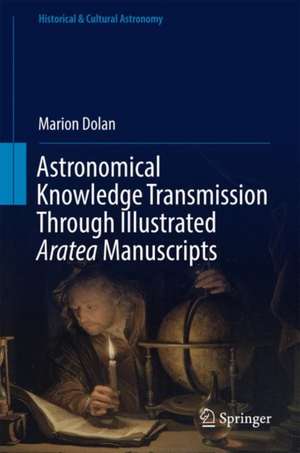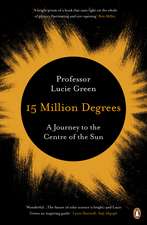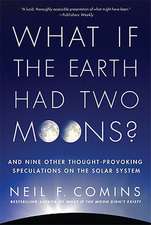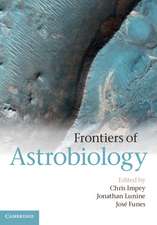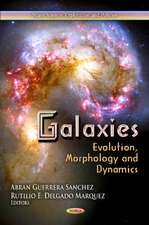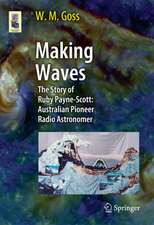Astronomical Knowledge Transmission Through Illustrated Aratea Manuscripts: Historical & Cultural Astronomy
Autor Marion Dolanen Limba Engleză Hardback – 11 sep 2017
This book brings a better understanding of the history, changes and transmission of the original astronomical Phaenomena poem. Historians, art historians, astronomy lovers, and historians of astronomy will learn more specialized details concerning the Aratea and how the tradition survived from the Middle Ages. It is a credit to the poetry of Aratus and the later interpreters of the text that its pagan aspects were not edited nor removed, but respected and maintained in the exact same form despite the fact that all sixty Aratea manuscripts mentioned in this study were produced under the rule of Christianity.
| Toate formatele și edițiile | Preț | Express |
|---|---|---|
| Paperback (1) | 949.60 lei 38-44 zile | |
| Springer International Publishing – 10 aug 2018 | 949.60 lei 38-44 zile | |
| Hardback (1) | 967.03 lei 38-44 zile | |
| Springer International Publishing – 11 sep 2017 | 967.03 lei 38-44 zile |
Din seria Historical & Cultural Astronomy
- 18%
 Preț: 1028.64 lei
Preț: 1028.64 lei - 20%
 Preț: 883.93 lei
Preț: 883.93 lei - 18%
 Preț: 819.50 lei
Preț: 819.50 lei - 24%
 Preț: 841.72 lei
Preț: 841.72 lei - 18%
 Preț: 788.72 lei
Preț: 788.72 lei - 18%
 Preț: 896.84 lei
Preț: 896.84 lei - 18%
 Preț: 733.46 lei
Preț: 733.46 lei - 24%
 Preț: 585.77 lei
Preț: 585.77 lei - 18%
 Preț: 891.80 lei
Preț: 891.80 lei - 18%
 Preț: 948.92 lei
Preț: 948.92 lei -
 Preț: 410.28 lei
Preț: 410.28 lei - 18%
 Preț: 1004.99 lei
Preț: 1004.99 lei -
 Preț: 381.81 lei
Preț: 381.81 lei - 24%
 Preț: 1083.75 lei
Preț: 1083.75 lei - 18%
 Preț: 907.73 lei
Preț: 907.73 lei - 24%
 Preț: 709.95 lei
Preț: 709.95 lei - 18%
 Preț: 947.67 lei
Preț: 947.67 lei -
 Preț: 355.47 lei
Preț: 355.47 lei - 18%
 Preț: 915.48 lei
Preț: 915.48 lei - 18%
 Preț: 777.03 lei
Preț: 777.03 lei - 18%
 Preț: 954.77 lei
Preț: 954.77 lei - 24%
 Preț: 646.49 lei
Preț: 646.49 lei - 24%
 Preț: 745.64 lei
Preț: 745.64 lei - 20%
 Preț: 583.95 lei
Preț: 583.95 lei - 18%
 Preț: 947.18 lei
Preț: 947.18 lei - 24%
 Preț: 1349.49 lei
Preț: 1349.49 lei - 18%
 Preț: 895.58 lei
Preț: 895.58 lei - 18%
 Preț: 796.61 lei
Preț: 796.61 lei - 18%
 Preț: 893.05 lei
Preț: 893.05 lei - 24%
 Preț: 1216.64 lei
Preț: 1216.64 lei - 18%
 Preț: 1118.75 lei
Preț: 1118.75 lei - 18%
 Preț: 1237.80 lei
Preț: 1237.80 lei
Preț: 967.03 lei
Preț vechi: 1272.41 lei
-24% Nou
Puncte Express: 1451
Preț estimativ în valută:
185.06€ • 200.95$ • 155.45£
185.06€ • 200.95$ • 155.45£
Carte tipărită la comandă
Livrare economică 19-25 aprilie
Preluare comenzi: 021 569.72.76
Specificații
ISBN-13: 9783319567839
ISBN-10: 3319567837
Pagini: 464
Ilustrații: XXIV, 464 p. 117 illus., 116 illus. in color.
Dimensiuni: 155 x 235 mm
Greutate: 0.95 kg
Ediția:1st ed. 2017
Editura: Springer International Publishing
Colecția Springer
Seria Historical & Cultural Astronomy
Locul publicării:Cham, Switzerland
ISBN-10: 3319567837
Pagini: 464
Ilustrații: XXIV, 464 p. 117 illus., 116 illus. in color.
Dimensiuni: 155 x 235 mm
Greutate: 0.95 kg
Ediția:1st ed. 2017
Editura: Springer International Publishing
Colecția Springer
Seria Historical & Cultural Astronomy
Locul publicării:Cham, Switzerland
Cuprins
Chapter 1: Background and Objectives.- Chapter 2: Possible Classical Models for Aratea Illustrations.- Chapter 3: Astronomical Knowledge Transmission Through Illustrated Aratea Manuscript.- Chapter 4: The Transmission of Astronomy and Astrology in the Medieval Islamic World.- Chapter 5: Introduction of Arabic Astronomy and Illustrative Traditions to the Latin West.- Chapter 6: Astronomical Symbolism in the Carolingian Period.- Chapter 7: Ninth-Century Aratea Manuscripts.- Chapter 8: Analysis and Conclusions.- Appendices.- Bibliography.- Index.
Notă biografică
Marion Dolan is a retired professor, having taught at University of Pittsburgh and Carlow University, Pittsburgh, as an adjunct in the department of History of Art and Architecture for over twelve years. Her BS degree was earned in the History and Philosophy of Science, concentrating on Astronomy. She received a MFA and a PhD in History of Art and Architecture, specializing in scientific medieval manuscripts, all from the University of Pittsburgh. She spent a year writing her doctoral dissertation, The Role of the Aratea in the Transmission of Astronomical Knowledge in the Middle Ages, and two preceding years researching and inspecting medieval astronomical and Aratea manuscripts in European libraries. Her research also resulted in the publication of an historical novel, The Silence of Heresy, based on the life of Frederick II.
Textul de pe ultima copertă
This carefully researched monograph is a historical investigation of the illustrated Aratea astronomical manuscript and its many interpretations over the centuries. Aratus' 270 B.C.E. Greek poem describing the constellations and astrological phenomena was translated and copied over 800 years into illuminated manuscripts that preserved and illustrated these ancient stories about the constellations. The Aratea survives in its entirety due to multiple translations from Greek to Latin and even to Arabic, with many illuminated versions being commissioned over the ages. The survey encompasses four interrelated disciplines: history of literature, history of myth, history of science, and history of art. Aratea manuscripts by their nature are a meeting place of these distinct branches, and the culling of information from historical literature and from the manuscripts themselves focuses on a wider, holistic view; a narrow approach could not provide a proper prospective. What is most essential to know about this work is that because of its successive incarnations it has survived and been reinterpreted through the centuries, which speaks to its importance in all of these disciplines.
This book brings a better understanding of the history, changes and transmission of the original astronomical Phaenomena poem. Historians, art historians, astronomy lovers, and historians of astronomy will learn more specialized details concerning the Aratea and how the tradition survived from the Middle Ages. It is a credit to the poetry of Aratus and the later interpreters of the text that its pagan aspects were not edited nor removed, but respected and maintained in the exact same form despite the fact that all sixty Aratea manuscripts mentioned in this study were produced under the rule of Christianity.
This book brings a better understanding of the history, changes and transmission of the original astronomical Phaenomena poem. Historians, art historians, astronomy lovers, and historians of astronomy will learn more specialized details concerning the Aratea and how the tradition survived from the Middle Ages. It is a credit to the poetry of Aratus and the later interpreters of the text that its pagan aspects were not edited nor removed, but respected and maintained in the exact same form despite the fact that all sixty Aratea manuscripts mentioned in this study were produced under the rule of Christianity.
Caracteristici
Tracks the many variants on the original manuscript by Aratus, from Cicero’s Aratea to Germanicus’ Aratea, each with distinctive illustrations and different distribution paths Demonstrates the increased popularity of Aratea manuscript production during the Italian Renaissance, in the royal courts of Europe, and also the role of Arab scholars in transmitting similar astronomical knowledge Elaborates on the many specific functions of the text and images commonly found in illustrated Aratea manuscripts Includes supplementary material: sn.pub/extras
